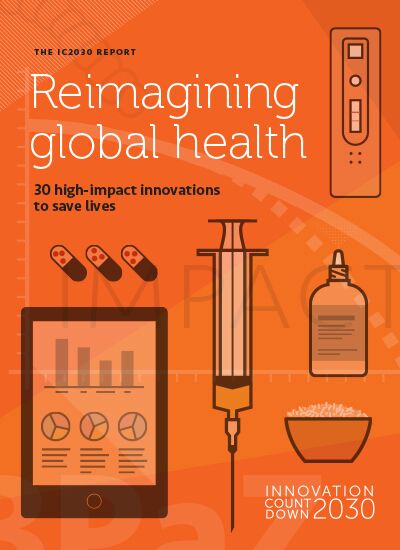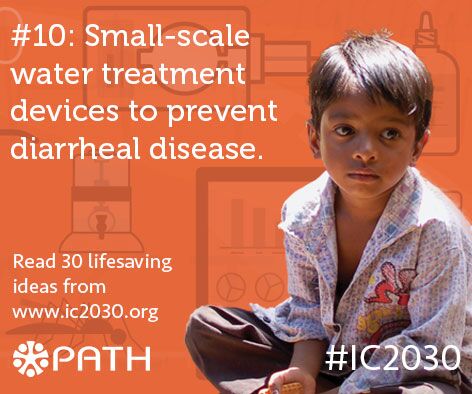Diarrhea solutions 2.0
|

It started with more than 500 global health innovations submitted by people in more than 50 countries.
Filtered through more than 60 independent health experts and a rating scale measuring factors like affordability, accessibility, and effectiveness, 30 high-impact innovations rose to the surface. The result: Reimagining Global Health, the inaugural report of the PATH-led Innovation Countdown 2030 Initiative (IC2030) to assess the innovations that hold the most game-changing potential for the global health landscape over the next fifteen years.
We know that investments in child health are some of the most practical investments that nations can make for their futures. So, our DefeatDD team was pleased to see that there are innovations in this report that directly address diarrheal disease.
Some of you may be thinking, “Now, hang on a minute. Don't we already know how to prevent and treat diarrheal disease?” True enough, savvy advocate. We know what works, and we've dedicated our DefeatDD Initiative to raising awareness about how these solutions can prevent needless morbidity and death due to diarrhea.
But that's not the end of the story. The solutions are essentially end goals, but the means are numerous. And an ongoing commitment to innovation - and conversation - about how to make their use practical, affordable, and accessible for the people who need them most is the best way to make the greatest impact.
You can find the diarrhea-specific innovations on page 17-18 of the report. Here's a summary of what we'll call “diarrhea solutions 2.0” and how they can complement and enhance our tried-and-true toolbox:
· New treatments for severe diarrhea - specifically, treatments to supplement oral rehydration solution (ORS). ORS isn't going anywhere; true to its name, its remarkably effective rehydrating properties have saved millions of lives. But despite its effectiveness, studies have revealed that demand is low in certain settings because it doesn't reduce stool output: a main priority for many caregivers. There are also challenges regarding the ambitious recommended dosage. New treatments highlighted in the report aim to complement ORS and tackle these barriers.
barriers.
· Rice fortification - Malnutrition and repeated bouts of diarrhea create a vicious cycle that can threaten physical and cognitive development, education, and future productivity. But figuring out how to ensure adequate nutrition can be a tough nut to crack. Rice is a staple food in many parts of the world, making rice fortification a cost-effective and easily accessible wayfor families to ensure their children get the nutrition they need.
· New tools for small-scale water treatment - Small-scale, BIG need. We're not surprised it made the short list of innovations, because the best way to save lives, money, and suffering from diarrhea is to prevent it from happening in the first place. Simple, powerful technologies (like the SE200 Community Chlorine Maker) that can disinfect hundreds of liters in one use hold truly exciting potential.
Like I said, innovation is about conversation. Download the report and give us your take. Which innovations do you think hold the most potential? What would you like to see featured in a future report? (Innovative sanitation solutions would get my vote!) Join the conversation at #IC2030.














